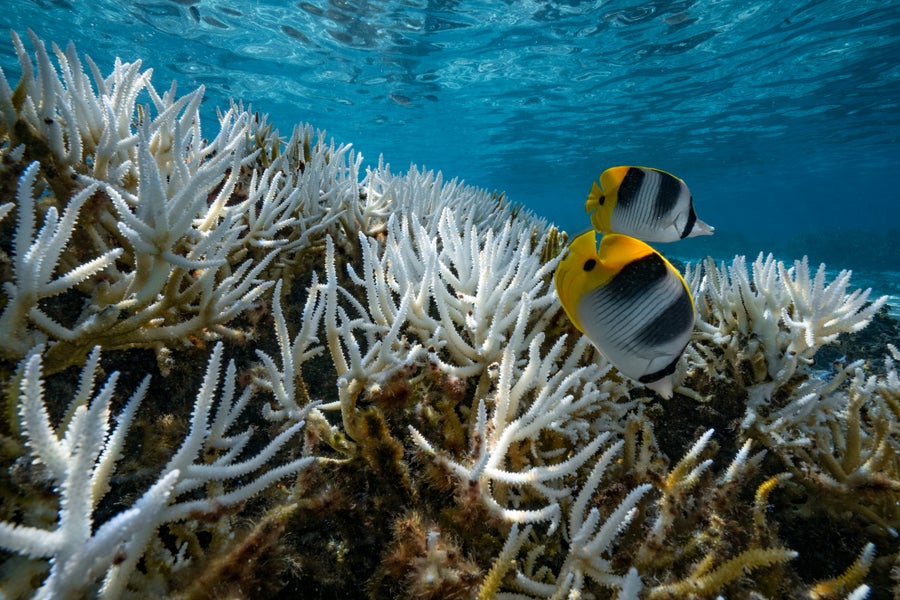
[ad_1]
It’s Never Too Late to Take Climate Action
The depiction of the climate crisis as a cliff—once we fall off the edge, it’s game over—is nonsense

Daniel Grizelj/Getty Caption
It’s official: this February was the hottest one on record. You may have noticed something odd when you stepped outside your door and winter was missing. It turns out the weather weirdness was worldwide. In case you missed it, this comes on top of the news that January was the hottest ever, too, and that 2023 was the hottest year we’ve experienced so far.
Again and again, climate activists have warned that we have only so much time left to head off catastrophe. Soon, we are told, it will be “too late” to save the planet and ourselves. Their message rests on the assumption that fear is the most potent spur to action.
This communication strategy is deeply flawed. Politically, it leads many to despair that all is lost. When the climate apocalypse fails to arrive on schedule, it leads others to seek comfort in the parable of the boy who cried wolf. Scientifically, the depiction of the climate crisis as a cliff—once we fall off the edge, it’s game over—is nonsense. Climate change does not end with a grand finale. Instead, it unleashes a cascade of mounting damages that will escalate exponentially over time.
On supporting science journalism
If you’re enjoying this article, consider supporting our award-winning journalism by subscribing. By purchasing a subscription you are helping to ensure the future of impactful stories about the discoveries and ideas shaping our world today.
This was brought home to me recently when I heard Jeff Miller, a retired fisheries biologist with the Virgin Islands National Park, give a talk about one of the greatest biodiversity disasters happening now: the collapse of coral reefs around the world. These natural wonders provide crucial habitat for vast numbers of fish and other marine life. Miller described the chain reaction that occurs as warming ocean waters disrupt the symbiotic relationship between the coral organisms and the algae that live inside them, whose photosynthesis feeds the coral and creates its vivid colors. When the sea gets too hot, the algae start producing toxins that force the corals to expel them—“vomiting into the sea,” he called it—causing the coral to bleach. Much of the coral dies as a result, from either starvation or higher susceptibility to disease.

A view of major bleaching on the coral reefs of the Society Islands on May 9, 2019 in Moorea, French Polynesia.
Credit: Alexis Rosenfeld/Getty Images
But after sharing this dismal news, Miller pivoted to his main point: today’s surviving coral is even more valuable than the coral that we have lost, precisely because its genetic make-up has allowed it to make it this far. In coral reefs, we are witnessing the survival of the fittest in fast-forward. Saving what remains becomes more valuable with each passing day.
The exponential nature of climate damages can be seen in hurricanes, too. A doubling of windspeeds does not merely double the damage, or even quadruple it: the damage rises eight-fold. When Hurricane Katrina struck New Orleans in 2005, the devastation was rightly termed catastrophic. Likewise, when the one-two punch of Hurricanes Maria and Irma devastated Puerto Rico and the Virgin Islands in 2017, and again when Hurricane Ian hammered Florida’s Gulf coast in 2022. But the lesson from these disasters is not “game over.” It’s that having witnessed these opening salvos, it’s more important than ever to get our collective acts together.
To be sure, the news on the climate front is already bad enough. But if you think that last year’s heat wave or drought or wildfire or flood or hurricane (circle the ones that apply where you live) was terrible, the take-home message is not that all is lost, but that it’s time to find an exit ramp off our current path. Even as climate change impacts ever more people ever more dramatically, it is never too late to act. On the contrary, the case for action grows ever stronger.
At the 2015 Paris climate summit, the world’s governments agreed that to head off unacceptable climate change we should aim to hold the increase in global average temperature to 1.5 degrees Celsius (2.7 degrees Fahrenheit) above the pre-industrial level and limit it to 2 degrees Celsius (3.6 degrees Fahrenheit) above that level at most. Scientists warn that we are on track to blow by the first target within the current decade—in fact, we already hit it in 2023 perhaps due to El Niño—and that unless we change course we will surpass the second by mid-century.
It will be tragic if we push the planet past these limits. We should do all we can to prevent this from happening, above all by ending our addiction to fossil fuels. But it will be even more tragic if, having already inflicted grievous harm on current and future generations, we respond by playing dead. Instead, we should redouble our efforts to head off even worse outcomes.
[ad_2]